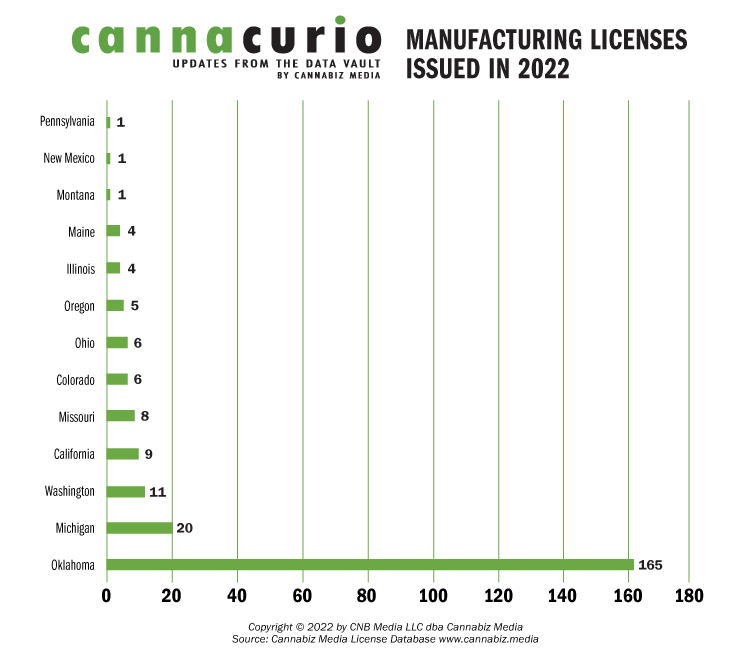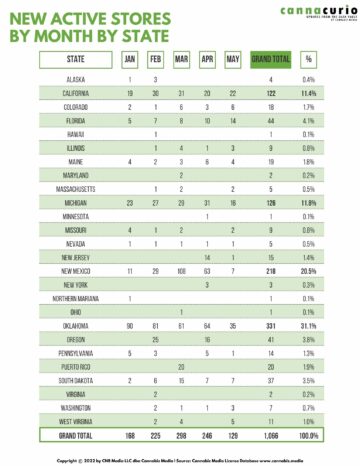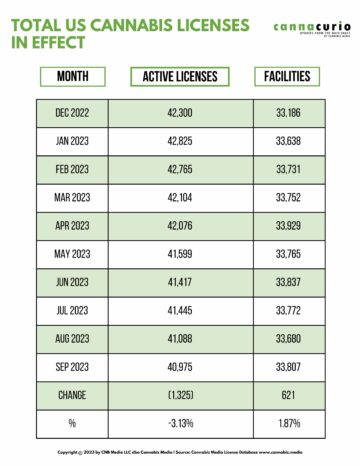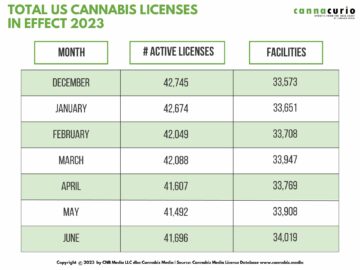Be the first to know when new content like this is available!
Subscribe to our newsletter to get alerts about new posts, local news, and industry insights.
Thank you! Your submission has been received!
Oops! Something went wrong while submitting the form.
Cannabis manufacturing licenses are issued at a slower pace than cultivation or retail licenses. However, they serve as important assets for companies because the products are often powerful brands. These brands, unlike license assets, can cross state lines and will undoubtedly help well established companies thrive and build market share.
Background
We categorize a license as a manufacturer if it fits the following description: License is for the processing (manufacturing) of marijuana-infused products, such as edibles or concentrates, but does not include cultivation or retail sale to customers (flower in, product out).
States are rarely in harmony when it comes to these licenses. In some jurisdictions, the cultivation and manufacturing activities may be combined into a single license like in Connecticut and New Mexico. In other jurisdictions, like Florida and New York, the license holder is required to do all growing, manufacturing, and sales with their license. Georgia and Alabama are heading down this oligopolistic route as well.
We ended 2021 with 5,735 manufacturing licenses – up from 4,611 a year before. So far this year, states have added 241 more licenses in the first two months of the year.


Leaderboard
Here’s the Leaderboard comparing Year End 2020, Year End 2021, and February 2022. As usual, the leaderboard is highly concentrated with five states accounting for 77% of the licenses.

Conclusion
Some consider manufacturing to be one of the sweet spots in the cannabis value chain. You are not subject to the challenges of agriculture or commoditization nor do you have to deal with the thin margins in the retail space.
Manufacturers have the best opportunity to build a brand, and this makes it an attractive part of the value chain for transplanted talent from liquor, packaged goods, and pharmaceuticals because it seems familiar. As MSO’s continue to merge, it will be interesting to track how they handle these assets – subject to any state caps. There are certainly concentrations of these licenses in legacy and large market states.
About the Author
Ed Keating is a co-founder of Cannabiz Media and oversees the company’s data research and government relations efforts. He has spent his career working with and advising information companies in the compliance space. Ed has managed product, marketing, and sales while overseeing complex multijurisdictional product lines in the securities, corporate, UCC, safety, environmental, and human resource markets.
At Cannabiz Media, Ed enjoys the challenge of working with regulators across the globe as he and his team gather corporate, financial, and license information to track the people, products, and businesses in the cannabis economy.
Ed graduated from Hamilton College and received his MBA from the Kellogg School at Northwestern University.
Cannabiz Media customers can stay up-to-date on these and other new licenses through our newsletters, alerts, and reports modules. Subscribe to our newsletter to receive these weekly reports delivered to your inbox. Or you can schedule a demo for more information on how to access the Cannabiz Media License Database yourself to dive further into this data.
Cannacurio is a weekly column from Cannabiz Media featuring insights from the most comprehensive license data platform. Catch up on Cannacurio posts and podcasts for the latest updates and intel.
- SEO Powered Content & PR Distribution. Get Amplified Today.
- Platoblockchain. Web3 Metaverse Intelligence. Knowledge Amplified. Access Here.
- Source: https://www.cannabiz.media/blog/cannacurio-55-manufacturing-licenses
- 100
- 2020
- 2021
- 2022
- 7
- a
- About
- access
- Accounting
- across
- active
- activities
- added
- advising
- agriculture
- Alabama
- All
- and
- Assets
- attractive
- because
- before
- BEST
- brand
- brands
- build
- businesses
- cannabis
- Cannabiz Media
- caps
- Career
- certainly
- chain
- challenge
- challenges
- Co-founder
- College
- Column
- combined
- Companies
- Company’s
- comparing
- complex
- compliance
- comprehensive
- Concentrated
- Concentrates
- Connecticut
- Consider
- content
- continue
- Corporate
- Cross
- cultivation
- Customers
- data
- Data Platform
- Database
- deal
- delivered
- description
- down
- economy
- ed
- efforts
- environmental
- established
- familiar
- Featuring
- financial
- First
- florida
- flower
- following
- form
- from
- further
- Georgia
- get
- globe
- goods
- Government
- Growing
- Hamilton
- handle
- Harmony
- Heading
- help
- highly
- holder
- How
- How To
- However
- HTTPS
- human
- HUMAN RESOURCE
- important
- in
- In other
- include
- industry
- Industry Insights
- information
- insights
- Intel
- interesting
- Issued
- IT
- jurisdictions
- Know
- large
- latest
- Legacy
- License
- licenses
- lines
- local
- MAKES
- managed
- Manufacturer
- manufacturing
- margins
- Market
- Marketing
- Markets
- MBA
- Media
- Merge
- Mexico
- Modules
- months
- more
- most
- New
- New York
- news
- Newsletter
- Newsletters
- Northwestern University
- ONE
- Opportunity
- Other
- Pace
- part
- People
- pharmaceuticals
- platform
- plato
- Plato Data Intelligence
- PlatoData
- Podcasts
- Posts
- powerful
- processing
- Product
- Products
- receive
- received
- Regulators
- relations
- Reports
- required
- research
- resource
- retail
- Route
- Safety
- sale
- sales
- School
- Securities
- seems
- serve
- Share
- single
- So
- so Far
- some
- something
- Space
- spent
- State
- States
- stay
- subject
- submission
- such
- sweet
- Talent
- team
- The
- their
- this year
- Thrive
- Through
- to
- Total
- track
- undoubtedly
- university
- up-to-date
- Updates
- value
- weekly
- while
- will
- working
- Wrong
- year
- Your
- yourself
- zephyrnet









